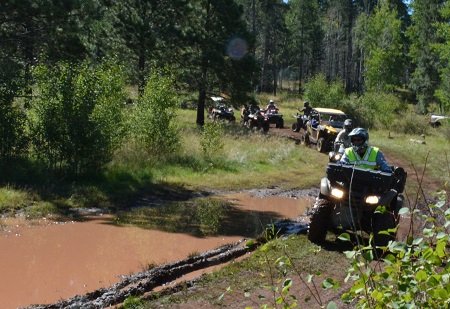The July Fourth weekend is coming up, which means a great number of Americans will be taking their dirt bikes, dune buggies and all-terrain vehicles out to the deserts and open up their throttles.
An American tradition is capped only by the smell of exhaust and the high-pitch sounds of engines as off-road enthusiasts plan to make the most out of the holiday weekend.
It’s also a time when law enforcement and emergency responders are on high alert. The Arizona Game and Fish Department recently reminded operators of off-highway vehicles 10 steps to ensure off-roading safety.
RELATED: An Off-Road Vehicle Safety Check-List You Can Use
Always wear a helmet
You would be surprised at how many people think they are invincible and choose not to wear a helmet. No matter how hot it is, or how goofie it looks, a helmet will save your life. For those under 18, they are often required.
Eye protection
For off-road vehicles not equipped with a wind screen, eye protection is legally required in most states.
Wear proper clothing
Riding gloves, long-sleeve shirt, pants and over-the-ankle boots are essential riding gear. Not shorts, t-shirt and flip-flops.
RELATED: 5 Off-Road Desert Adventures You Can’t Miss
Supervise children
It’s important that kids ride an age-appropriate vehicle. Adult model machines could overpower the rider and lead to accidents. For minors, parents are responsible for their children’s safety.
Follow riding capacity
It’s important not to overload a vehicle with too many passengers. Every machine has a maximum recommended number of passengers. Too much weight can change how the vehicle responds.
Stay on designated trails
Venturing off trail means you are not being a considerate rider because endangers the sustainability of the riding area. Stay on trail to ensure that the wonderful resource you enjoy today will be there tomorrow.
RELATED: 14 Awesome Gifts for Off-Road Enthusiasts
Be prepared and equipped
Always be prepared for a breakdown. Carry enough survival equipment, including food and water, to spend the night if you have to. Bring maps, compass, first aid kit, whistle, tire repair kit, tow rope and other basic tools.
Avoiding drinking alcohol or drugs
It goes without saying, impaired judgement and motor skills can lead to accidents. Don’t do drugs.
Register your OHV
Even though it’s not street legal, you still have to register your OHV. Check with your state’s motor vehicle division for details.
Maintain your machine
Regular maintenance and care is always recommended, but especially take care of the spark arrester and muffler. Arresters help protect against sparking a wildlife and mufflers reduce noise levels.
Other than that, have fun!
Photo credit: Arizona Game and Fish








